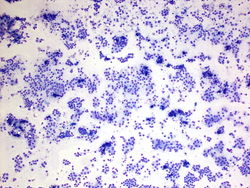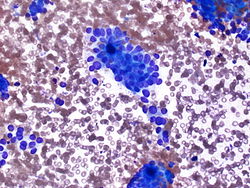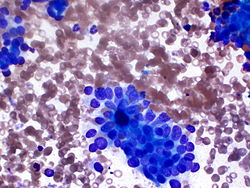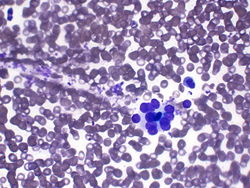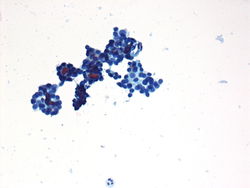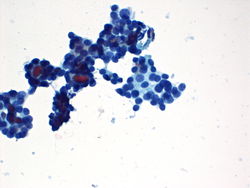Difference between revisions of "Cytologically Yours: CoW: 20140220"
(Created page with "== Clinical Summary == The patient is a 58 year old male with back and neck pain. === Past Medical History === * Cervical spondylosis * Hypertension * Hyperlipidemia === Pa...") |
|||
| Line 20: | Line 20: | ||
===Cytology=== | ===Cytology=== | ||
<gallery heights="250px" widths="250px"> | <gallery heights="250px" widths="250px"> | ||
| − | CytologicallyYoursCoW20140220Cytology1.jpg| | + | CytologicallyYoursCoW20140220Cytology1.jpg|20x magnification of a cellular specimen with numerous follicles and absent colloid. |
| − | CytologicallyYoursCoW20140220Cytology2.jpg| | + | CytologicallyYoursCoW20140220Cytology2.jpg|40x magnification with follicular cells forming microfollicular groups and inspissated colloid. |
| − | CytologicallyYoursCoW20140220Cytology3.jpg| | + | CytologicallyYoursCoW20140220Cytology3.jpg|60x magnification with follicular cells forming microfollicular groups and inspissated colloid. |
| − | CytologicallyYoursCoW20140220Cytology4.jpg|40x magnification | + | CytologicallyYoursCoW20140220Cytology4.jpg|40x magnification with follicular cells forming microfollicular groups and inspissated colloid. |
| − | CytologicallyYoursCoW20140220Cytology5.jpg|40x magnification of | + | CytologicallyYoursCoW20140220Cytology5.jpg|40x magnification of Pap stained material showing magnification with follicular cells forming microfollicular groups and inspissated colloid.. |
| + | CytologicallyYoursCoW20140220Cytology6.jpg|60x magnification of Pap stained material with microfollicles. | ||
</gallery> | </gallery> | ||
| Line 31: | Line 32: | ||
====Resident Questions==== | ====Resident Questions==== | ||
* <spoiler text="What is the differential diagnosis?"> In a cellular thyroid lesion, follicular neoplasm, including adenoma and carcinoma, and cellular benign follicular nodule are in the differential. Also in the differential is the follicular variant of papillary carcinoma. </spoiler> | * <spoiler text="What is the differential diagnosis?"> In a cellular thyroid lesion, follicular neoplasm, including adenoma and carcinoma, and cellular benign follicular nodule are in the differential. Also in the differential is the follicular variant of papillary carcinoma. </spoiler> | ||
| − | |||
<div class="usermessage mw-customtoggle-diagnosis" style="cursor:pointer">Click here to toggle the diagnosis and discussion.</div> | <div class="usermessage mw-customtoggle-diagnosis" style="cursor:pointer">Click here to toggle the diagnosis and discussion.</div> | ||
Revision as of 22:46, 4 March 2014
Contents
Clinical Summary
The patient is a 58 year old male with back and neck pain.
Past Medical History
- Cervical spondylosis
- Hypertension
- Hyperlipidemia
Past Surgical History
- No surgical history
Radiology
- Ultrasound of the neck shows a solid interpolar nodule 1.8 x 1.6 cm in the left lobe of the thyroid.
Clinical Plan
Fine needle aspiration of the nodule is scheduled.
Pathology
Cytology
Resident Questions
Final Diagnosis
Cytology
- Follicular neoplasm.
Discussion
The diagnostic criteria for follicular lesions are based on cellularity and the presence of colloid. Follicular lesions will be cellular with an absence of the variability in the size of the follicular groups, with a predominately microfollicular pattern. Colloid will be scant to absent, except for the presence of inspissated colloid in the center of follicular groups. There is often a disorganized, crowded follicular pattern with some nucleomegaly and nucleoli.
| ||||||||
